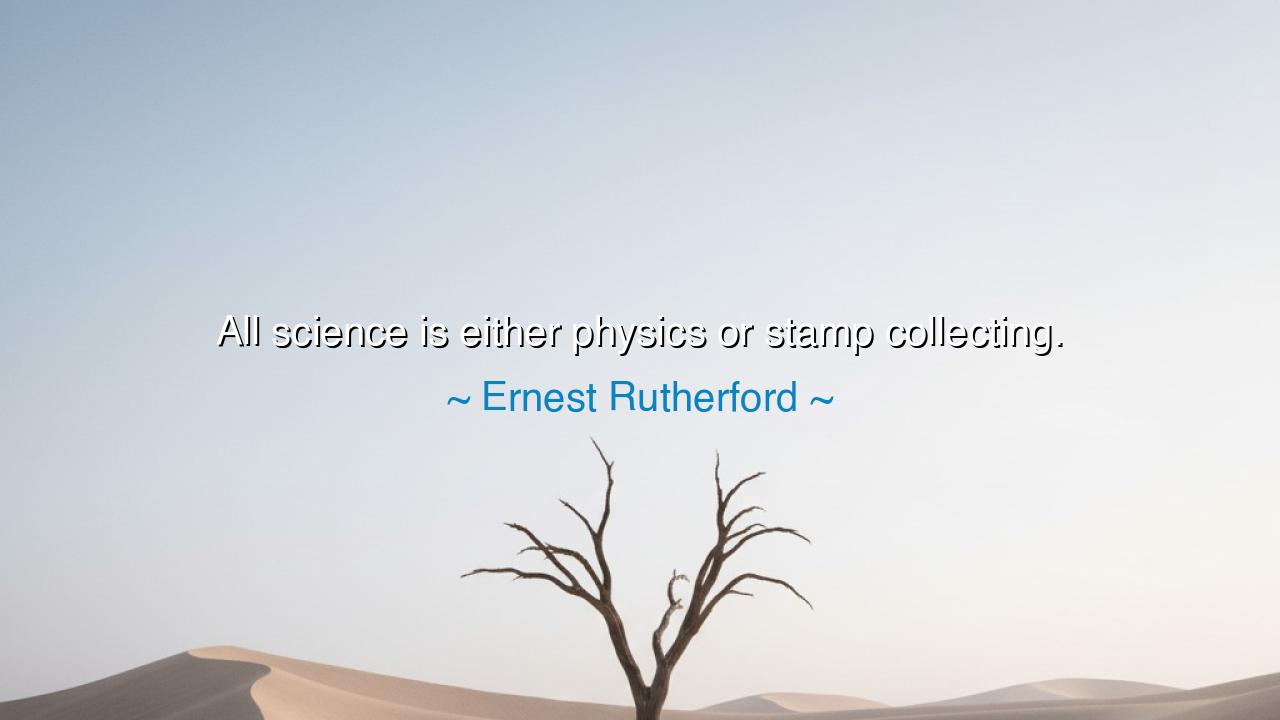
All science is either physics or stamp collecting.






"All science is either physics or stamp collecting." These bold words, spoken by the esteemed Ernest Rutherford, cut to the heart of the scientific endeavor and its true purpose. Rutherford, a towering figure in the field of physics, was pointing to a profound truth about the nature of knowledge. At the very core of science, Rutherford suggests, lies physics—the study of the fundamental laws of the universe. Everything else, he claims, is merely the act of cataloging phenomena without deeper insight. To Rutherford, science is not about collecting facts for the sake of knowledge, but about understanding the underlying principles that govern everything from the motion of planets to the behavior of atoms.
In the ancient world, the great thinkers such as Aristotle and Pythagoras pursued knowledge with the belief that there was a unifying principle behind all of existence. Pythagoras saw the world in terms of numbers and mathematics, believing that the universe itself was bound by the harmony of mathematical ratios. This belief in a singular underlying truth was a precursor to what Rutherford would later express: that true science—whether in philosophy or physics—is not about the mere collection of observations, but about discerning the universal laws that govern all things. For them, the search for knowledge was a search for unity, not just a cataloging of the world’s complexity.
Rutherford’s quote brings to mind the story of Isaac Newton, the brilliant scientist whose work revolutionized our understanding of gravity and motion. Newton did not merely collect data; he sought to uncover the laws that govern the behavior of all physical objects. Through his mathematical formulations, Newton revealed that the motion of the planets, the fall of an apple, and the ebb and flow of the tides were all manifestations of a single force—gravity. Newton’s work was not about compiling observations but about understanding the universal principles behind them. He was a scientist in the truest sense, seeking to understand the mechanisms of nature, not simply to observe and catalog its phenomena.
Consider the study of chemistry, a field that, in Rutherford’s time, was often seen as a collection of facts about substances and reactions. While chemistry in itself has proven to be immensely valuable, it was only through the development of atomic theory and the study of quantum mechanics—disciplines born of physics—that chemistry began to unlock its deepest secrets. The discovery of the electron, for example, by J.J. Thomson and the subsequent understanding of atomic structure were not mere acts of collecting chemical facts but the pursuit of a deeper scientific unity—the understanding of the atomic building blocks of matter. These discoveries were the work of physicists, seeking not to catalogue what they could see, but to uncover the very foundation of the material world.
Rutherford himself, in his pioneering experiments on the structure of the atom, exemplified the truth of his own words. His discovery that the atom was mostly empty space with a dense nucleus at its center revolutionized the understanding of matter. Prior to Rutherford’s experiments, scientists had been collecting facts about atoms, but it was his theoretical insight and his ability to ask the right questions that propelled him into the realm of true science. Rutherford’s scientific method was not just the accumulation of data; it was about seeking the underlying truths of atomic structure, laying the groundwork for the fields of nuclear physics and quantum theory.
The lesson from Rutherford’s words is clear: science is not a mere collection of observations, but a pursuit of understanding—the search for the fundamental principles that govern the universe. Whether in physics, biology, chemistry, or any other field, true scientific inquiry seeks to answer the why behind the what. The act of stamp collecting, or gathering facts without deeper understanding, is not the true essence of science. True science seeks to explain the forces that shape the world, to uncover the hidden laws behind nature’s phenomena.
In our own lives, we must approach knowledge with the same intellectual vigor and curiosity that Rutherford and his contemporaries did. Let us not be content with simply gathering facts or following the conventional wisdom of the day. Instead, let us seek the deeper understanding of the world around us, asking not just what is, but why it is, and how it fits into the greater order of the universe. Whether in science, art, or philosophy, the true pursuit of knowledge lies not in accumulating data but in seeking the fundamental truths that bind everything together. In doing so, we fulfill the true essence of scientific inquiry—moving beyond the surface to uncover the hidden laws that govern all existence.






AAdministratorAdministrator
Welcome, honored guests. Please leave a comment, we will respond soon